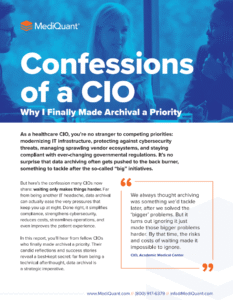Unlocking the Power of Legacy Data Archiving to Deliver Better Patient Care
Care Coordination

Patient Engagement and Satisfaction
Research, Innovation, and AI
Compliance, Benchmarking, and Audits
Data Cleanliness, Security, and Access
Let’s face it, old data is problematic. Storing it in an old system means keeping that system up and running, an expensive proposition. Migrating it means making decisions about how the migration will occur, where the data migrate to, and how much will be available to providers from within the EHR.
For many, the solution is an archive that’s contextually linked to the EHR, letting providers easily access older systems to retrieve patient data. Here are a few considerations regarding data archiving:
- Your legacy data may include errors, and the archiving process presents a great opportunity to clean it. Develop a strategy for finding duplicates, fixing errors, and purging data that is outside your retention policy.
- The archiving process matters, so make sure your archive partner will ensure your data won’t lose context, will support provider workflow, and is accessible to patients as needed.
- Interoperability is essential. Your archive should be robustly tied into your EHR, whether it’s via a traditional interface like HL7, APIs within your EHR, or middleware.
- Security is also essential. Your legacy data should be HITRUST certified, and users should only be able to access the data needed for their work.

More Thought-Leadership
The Most Important Tech Investments Hospitals are Making and Why
In collaboration with Becker's Hospital Review Amid today's extremely challenging financial environment, hospitals are focused on adopting technology that can drive efficiency, provide return on investment and strengthen team cohesion and buy-in. During an...
The Case For An Active Data Archive After Acquisition — 5 Takeaways For Health Systems
By Cindy Adkins After making acquisitions, healthcare organizations want to use the same enterprise systems across all facilities, which raises the question about what to do with the legacy systems and data. During a June featured session sponsored by MediQuant as...
How Health Systems Can Comply with Information Blocking Provisions of the Cures Act
In Collaboration with Becker’s Hospital ReviewFor years, the question of who actually owns patient healthcare data loomed unanswered. With the passage of the 21st Century CURES Act, this issue has been definitively resolved: health systems and providers do not own...
Contact Us Today







